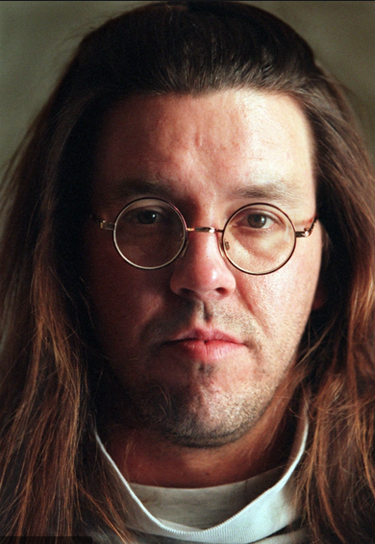
The late David Foster Wallace.
I’m going to have to start reading Dale Peck‘s novels. He has the good taste to recognize that Pynchon, DeLillo, and especially David Foster Wallace are not any good.
The US literary world can be divided into two camps: those who think Thomas Pynchon is a very clever guy, and those who also think he’s a great writer. As it happens, I’m of the former camp. While I admit that Pynchon’s writing is packed with all sorts of ideas, ultimately the novels strike me as more crudités than smorgasbord: the appetisers keep coming (and coming, and coming), but the main course never arrives. Pynchon’s hallmarks are his tentacular – I might almost say his amorphous – prose, which can and does snare just about any philosophical concept or pop cultural phenomenon in its grasp; and his sense of satire, which can be awfully funny if your taste runs to broad humour. Neither of these traits is necessarily ruinous, but it’s Pynchon’s particular conflation of them that can limit his appeal. Given a choice between pathos and bathos, Pynchon errs on the side of farcical melodrama again and again (and again), and while I admire him for his efforts to undermine traditional narrative tyranny with humour rather than resorting to a Barth-style hatchet job, all four of his novels offer the same one-dimensional commentary on contemporary US society, and, in the end, a thirty-year writing career hasn’t produced a single memorable or even recognisably human character.
Pynchon does have his admirers, and he also has his followers, or people who are labelled his followers, and they do keep cropping up. I think there’s more than a little Pynchon floating around John Kennedy Toole, whose A Confederacy of Dunces is a book nearly as bloated as its protagonist; Don DeLillo’s social, um, satires owe more than a little to Pynchon’s work; and in a recent essay in Harper’s magazine the young novelist Jonathan Franzen declares Pynchon a personal hero. David Foster Wallace moves beyond admiration to adulation – if not, to put it more plainly, outright imitation. It is, in fact, a virtuoso performance that has eclipsed its progenitor: Wallace out-Pynchons Pynchon, and his third book, Infinite Jest, may well be the first novel to out-Gravity’s Rainbow Gravity’s Rainbow.
If nothing else, the success of Infinite Jest is proof that the Great American Hype Machine can still work wonders, in terms of sales. The novel has moved some 60,000 copies and racked up a stack of glowing reviews as thick as it is. What makes the book’s success even more noteworthy is that it is, in a word, terrible. Other words I might use include bloated, boring, gratuitous, and – perhaps especially – uncontrolled. I would, in fact, go so far as to say that Infinite Jest is one of the very few novels for which the phrase ‘not worth the paper it’s written on’ has real meaning in at least an ecological sense; but to resort to such hyperbole would be to fall into the rut that characterises many reviews of this novel.
As the preceding paragraph should make clear, I found Infinite Jest immensely unsatisfactory. I resent the five weeks of my life I gave over to it; I resent every endlessly over-elaborated gag in the book, like the ten-page riff on why video telephones are unviable, or the dozen pages on the teenager who won all his tennis games by playing with a pistol held to his head, or the thousands and thousands and thousands of words devoted to pharmaceutical trivia on all sorts of mind-altering drugs; and I resent especially the 96 pages of tinily typed and deliberately pointless endnotes and ‘errata’, 388 in total, which make the novel a two-bookmark experience. In a hoped-for effort at balance, I also slogged my way through Wallace’s freshman effort, a novel called The Broom of the System, which, at 450 pages, is a relative lightweight next to Infinite Jest; nevertheless, what the novel saves in brevity is more than made up for in banality. The only thing even remotely interesting about Wallace’s first novel is that it reads like a study for his second. Both novels are set in an imagined United States; both revolve around an emotionally disturbed family full of geniuses, cripples and money; both feature a manmade wasteland which becomes central to the national imagination (in The Broom of the System it’s called the Great Ohio Desert, which is why the book is set in Ohio of all places; in Infinite Jest it’s called the Great Concavity); both, most importantly, work up an elaborate – and elaborately digressive – plot which deliberately ends as unsatisfactorily as possible.





Mike-SMO
If you want memorable characters, try any White Castle at 3 AM. Bring several “friends” so you can enjoy the show.
As well as I can remember [It was long ago.] Pynchon’s characters were almost irrelevant. I’d worked in several large “institutions” long enough to recognize that concept. Each character performed a function for the novel but was otherwise expendable.
For something more personal, I had several cats. One of the cats was the best dog I ever had. She even understood humor and irony.
Lee
When I was younger and more insecure, I thought maybe I wasn’t quite as intelligent as I thought I was because Pynchon and Infinite Jest totally escaped me. As I grew older, I didn’t care that they escaped me. And then I realized there wasn’t a whole lot of recent-ish fiction with reading. (Some Israeli stuff wasn’t too bad.) Pretty much in the past twenty years, I read mysteries and non-fiction.
Please Leave a Comment!